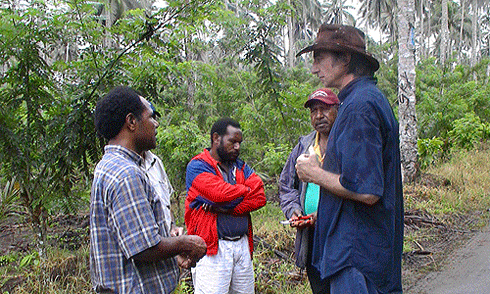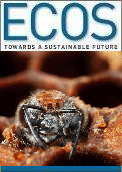
|
Published: 2 May 2012
Chocaholics beware a looming supply crisis
University of Sydney agricultural scientist Professor David Guest has warned those attending a ‘Chocolate crisis’ forum at the University that a supply problem may be iminent.

|
|
Professor David Guest (right) in Papua New Guinea with local scientists John Konam (left) and Anthon Kamuso (centre) with cacao farmers. Credit:
University of Sydney
|
‘We're in a situation where chocolate manufacturers are anxious about meeting demand, as there's rapidly increasing chocolate consumption in developing economies, paired with instability in cacao growing areas,’ says Prof. Guest.
Cacao is produced from fruit of the tropical tree Theobroma cacao, which translates as ‘food of the Gods’, grown in West Africa, South America, Southeast Asia and the Pacific.
‘Cacao is grown in areas vulnerable to climate change, political instability, pests and diseases,’ says Prof. Guest.
Threats to cacao production also include ageing plantations, poorly trained farmers and poorly managed trees, dependence on a narrow genetic base and crop substitution (for example the replacement of cacao by maize grown to meet the demand for bioethanol).
The threat of a chocolate shortage is exacerbated by the fact that global chocolate consumption is rising by two to three percent annually.
‘Chocolate consumption trends are different around the globe. In Australia, Europe and North America total consumption – around 6kg of chocolate per capita per year – is stable, but the trend is to dark chocolates or to niche marketed gourmet chocolates. Consumption dropped slightly during the global financial crisis in 2008 and 2009,’ says Prof. Guest.
‘In China, India, Eastern Europe and Brazil, however, per capita consumption rates are increasing rapidly, albeit from a relatively low base.
‘One estimate is that global production will need to increase by one million tonnes per year by 2020 – from 3.6 million tonnes in 2009/2010 – to meet global demand.’
Prof. Guest’s research supports the chocolate industry by improving the sustainability and profitability of smallholder cacao production. According to Prof. Guest, the work that he and his colleagues have done with farmers in Indonesia, Papua New Guinea and Bougainville shows that good farm management increases yields, resulting in improved living standards, reduced rainforest clearing, political and social stability, and securing future supplies of chocolate.
‘We work with farmers to select better genotypes of cacao, to demonstrate improved crop and soil management, to understand the constraints they face and what can be done to improve technical support,’ says Prof. Guest.
Source: University of Sydney



